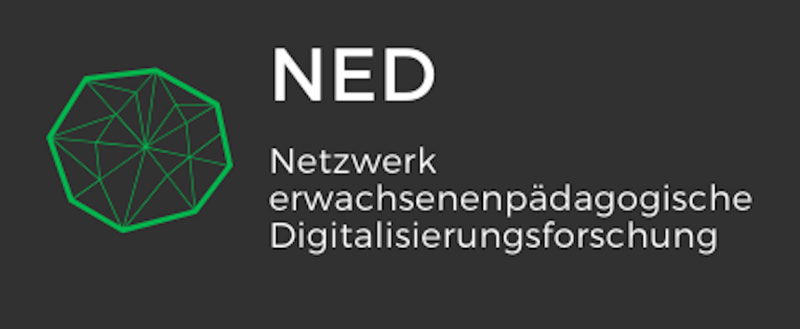Netzwerk Erwachsenenpädagogische Digitalisierungsforschung
The Network Adult Education Digitalisation Research (NED) is active within the Adult Education Section of the German Society for Educational Science (DGfE). It was founded at the annual conference of the Adult Education Section on 25 September 2019 in Halle (Saale). The network is a loose association of researchers and practitioners interested in continuing education research in the field of digital media and digitalisation.
The network is currently coordinated by Sophie Lacher and Kim-Maureen Martin.
Sophie Lacher, Rheinland-Pfälzische Technische Universität
Kim-Maureen Martin, Deutsches Institut für Erwachsenenbildung

Neuer Sammelband erschienen: Adult Education Research on Digitalisation (Open Access)
Wir freuen uns sehr, dass der Sammelband „Adult Education Research on Digitalisation: Concepts – Scopes – Understandings“ im Dezember 2025 erschienen ist, und gratulieren den Herausgebenden – den ehemaligen Koordinator*innen des NEDswerks – Franziska Bellinger (Universität zu Köln), Ricarda Bolten-Bühler (Euro-FH Hamburg) und Matthias Rohs (RPTU Universität Kaiserslautern-Landau) herzlich zur Publikation.
Als aktuelle Koordinatorinnen möchten wir gern kurz auf die Veröffentlichung aufmerksam machen und zur Verbreitung in den jeweiligen Kontexten ermuntern.
Open Access (kostenloser Download):
https://www.wbv.de/shop/Adult-Education-Research-on-Digitalisation-I78557
Printausgabe: https://www.wbv.de/shop/Adult-Education-Research-on-Digitalisation-I78540
Englische Beschreibung (Klappentext):
Digitalisation is profoundly transforming adult and continuing education – in teaching, in institutions, in education policy, and not least in research. This book provides a comprehensive overview of current academic work on this transformation and shows how digital technologies open up new opportunities, but also what challenges and risks they bring. The first part is devoted to the teaching and learning level. Based on current research findings, it illustrates how Artificial Intelligence (AI), Virtual Reality and digital educational offerings are changing adult/continuing education. The potential of digital learning formats is presented, but also the ethical, data protection and didactic questions that arise. The second part focuses on institutions, educational offerings and societal framework conditions. The contributions examine the use of digital platforms in the health sector, the influence of social media on political education, the design requirements for media-supported programmes, as well as questions of governance under the conditions of digitality. The third part illuminates theoretical and research-methodological questions on a meta-level. Topics discussed include competency requirements for dealing with generative AI, new questions in the context of digitalisation research, conditions for successful exchange between research and practice, as well as methodological approaches to analysing AI use in adult learning. With these contributions, this volume offers a multi-layered and current picture of how the digital transformation is shaping adult education in Germany and which perspectives and questions are significant in this context. It is aimed at academics who deal with the effects of digitalisation on adult education in an international context and who are interested in current research and theoretical developments.
Zitation:
Bellinger, F., Bolten-Bühler, R., & Rohs, M. (Hrsg.). (2025). Adult Education Research on Digitalisation: Concepts – Scopes – Understandings. wbv Publikation. https://doi.org/10.3278/9783763978557
Mit herzlichen Grüßen
Kim-Maureen Martin & Sophie Lacher
Aktuelle Koordinatorinnen des NED
NED Brown-Bag-Vortragsreihe
Seit Januar 2026 bietet die neue NED Brown-Bag-Vortragsreihe – ein offenes, niedrigschwelliges Mittagsformat zur erwachsenenpädagogischen Digitalisierungsforschung. Immer am zweiten Dienstag im Monat (12:30-13:30 Uhr) gibt es Input, Austausch und Diskussion per Zoom.
Den Auftakt machte Prof. Henning Pätzold, Universität Koblenz zum Thema: „KI-Kompetenzen und Anwendungsszenarien im Hochschulkontext“
Nächster Termin:
Am 10.02.2026 trägt Fabio Roman Lieder (Universität der Bundeswehr München) vor zum Thema: „Dokumentarische Methode in soziotechnischen Gefügen: Modulares Prompting als Spiegel methodischer Entscheidungen“
